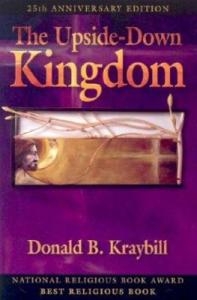The Upside-Down Kingdom, Chapter 8: Impious Piety
We continue here our discussion of Donald Kraybill’s classic book “The Upside Down Kingdom.” Chapter 8 is titled “Impious Piety” and deals with religious practices, especially among Christians. It begins, however, with a rather lengthy explanation of Hebrew religious practices in Jesus’s time and before and after. Kraybill argues that Jesus was not a rebel against true Judaism but one against the extreme legalism of the “scribes and the Pharisees.” That legalism included excluding people who were judged to be “impure” or “unclean” because of their lack of strict adherence to the traditions and/or because of their jobs or lifestyles or apparent lack of piety.
At the end of the chapter, or near it, Kraybill warns that “The symbols of the past threaten to become idolatrous.” That is aimed at us—contemporary Christians. Kraybill calls for constant reform within churches. An old Protestant principle is “Reformed and always reforming.” But Kraybill warns that we always have the tendency to make sacred cows out of old rituals and ways of doing things. I call this the “hardening of the categories.” I’ve seen it in many churches that I have attended and visited.
I grew up classical Pentecostal. When the charismatic movement broke out in the 1960s most of us were suspicious of it because it didn’t include our hardened categories such as no alcohol (even a little wine with a meal) and speaking in tongues must accompany the infilling of the Spirit. But what disturbed us most was that “Christians” of “mainline denominations” and even Catholics (!) were part of the movement, even making up the majority of the movement.
One of the early elders of the charismatic movement was a South African minister named David du Plessis, who I had the honor of meeting in about 1970 or 1971–at the first official meeting of the Society for Pentecostal Studies. I was a mere college student, but he conversed with me easily and without condescension. Because he dared to minister to Catholics and “mainline Protestants,” he was excluded from the ministerium of his own denomination, the Assemblies of God. (They later invited him back!)
Then came the Jesus People Movement with all its “hippie” culture. Many Pentecostals and others rejected all “Jesus Freaks” because of their clothes, hair and music. I was blessed to be a member of a church that welcomed them. But some members left the church because of that. Most of them were old-time Pentecostals suffering from hardening of the categories.
Does Kraybill and do I believe that all traditions are bad or that churches should have no boundaries in a kind of “anything goes” tradition? I don’t think so. I do believe, however, with Kraybill, that every church and every Christian organization should ask itself often whether its structures and practices are servants of the kingdom of God or sacred cows that hold back the advance of the upside-down kingdom that welcomes the unwelcome.
There is something anarchic about Kraybill’s vision of the kingdom of God. With that I agree except, and I think Kraybill would agree, there is one authoritative leader and that is Jesus Christ himself. I do not believe in church hierarchies. I believe in church leaders but without authority above the congregation. I take the principle of the priesthood of every believer seriously.
I once joined a relatively new congregation. For various reasons it met only on Sunday evenings in a rented space. It had no authority figures, but it did have a pastor and deacons. The pastor was the teacher, prophet, if you will, and the deacons were ministers to the people. Servanthood was emphasized. The church, very informal as it was, had very few “rules.” As I expected, however, over time it developed by-laws and rules and customary practices that hardened and became like shackles holding back the dynamic of the Spirit working through the pastor, the deacons and the members. That seems to be the way of all flesh, so to speak. Unless we are very vigilant against it.
Earlier, here, I argued that every church should have one person appointed to be the question-asker, always allowed, even encouraged, to ask “Why?” “Why do we do it this way?” “Is this the way we ought to do it?” “Is the way we do this compatible with the spirit of the ‘upside-down kingdom’?” I still believe such an “office” within the church would be helpful to hold back the natural trend toward the hardening of categories.
*Note: If














